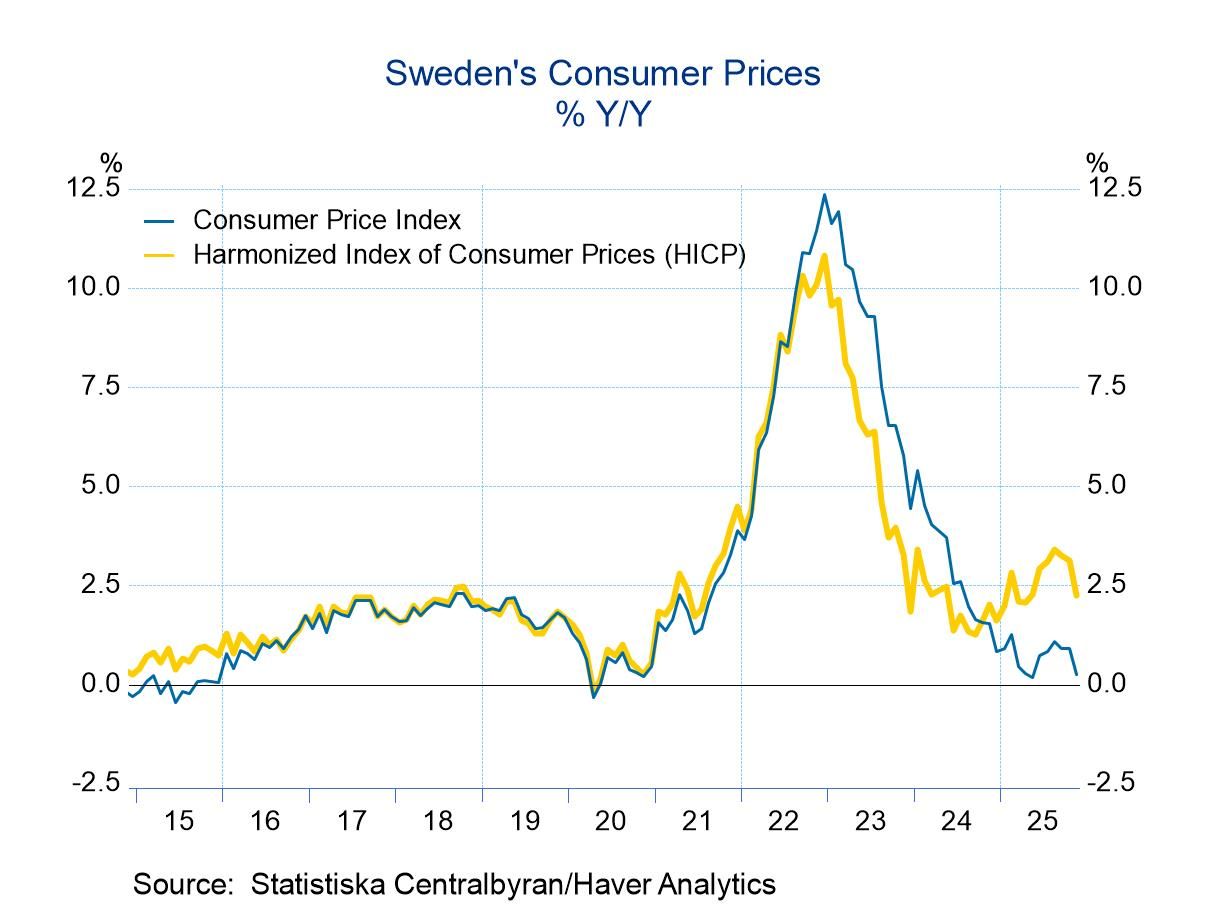 Global| Jan 25 2005
Global| Jan 25 2005Chain Store Sales Ticked Up
by:Tom Moeller
|in:Economy in Brief
Summary
Chain store sales recovered 0.1% of the prior two weeks' declines which had lowered sales 1.5% from the yearend high, according to the International Council of Shopping Centers (ICSC)-UBS survey. The average of sales in January are [...]
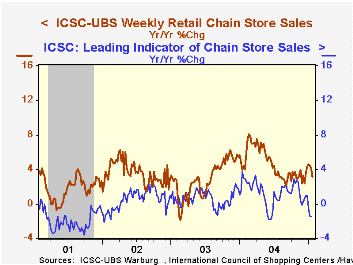
Chain store sales recovered 0.1% of the prior two weeks' declines which had lowered sales 1.5% from the yearend high, according to the International Council of Shopping Centers (ICSC)-UBS survey.
The average of sales in January are 1.5% ahead of December due to strong gains during the Holiday season.
During the last ten years there has been a 58% correlation between y/y change in chain store sales and the change in non-auto retail sales less gasoline, as published by the US Census Department.
The leading indicator of chain store sales from ICSC jumped 1.1% (-1.5% y/y) in the latest week.
The ICSC-UBS retail chain-store sales index is constructed using the same-store sales (stores open for one year) reported by 78 stores of seven retailers: Dayton Hudson, Federated, Kmart, May, J.C. Penney, Sears and Wal-Mart.
| ICSC-UBS (SA, 1977=100) | 01/22/05 | 01/15/05 | Y/Y | 2004 | 2003 | 2002 |
|---|---|---|---|---|---|---|
| Total Weekly Chain Store Sales | 444.3 | 443.9 | 3.1% | 4.6% | 2.9% | 3.6% |
by Tom Moeller January 25, 2005
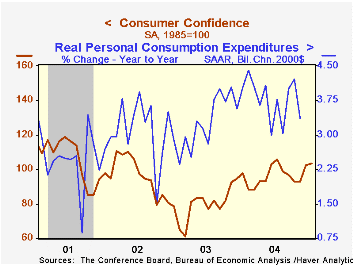
The Conference Board’s Index of Consumer Confidence ticked slightly higher in January to 103.4 and added to the upwardly revised 10.1 point surge in December. Consensus expectations had been for a slight backpedaling to 101.3.
The present situation index rose for the third straight month, adding 4.9% (+28.8% y/y) to the 9.8% gain in December. The index of consumer expectations retraced 2.3% (-6.6% y/y) of the 11.6% December pop.
During the last twenty years there has been a 51% correlation between consumer confidence and the y/y change in real consumer spending. The correlation rose to 66% during the last ten years.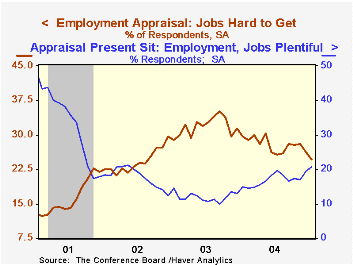
Perceptions of the job market continued to improve in January. Jobs were viewed as hard to get by 24.7% of survey participants, the lowest percentage since August 2002. Jobs were viewed as plentiful by 20.7% of survey participants, the highest also since 2002.
The Conference Board’s survey isconducted by a mailed questionnaire to 5,000 households and about 3,500 typically respond.
| Conference Board | Jan | Dec | Y/Y | 2004 | 2003 | 2002 |
|---|---|---|---|---|---|---|
| Consumer Confidence | 103.4 | 102.7 | 5.8% | 96.1 | 79.8 | 96.6 |
by Tom Moeller January 25, 2005
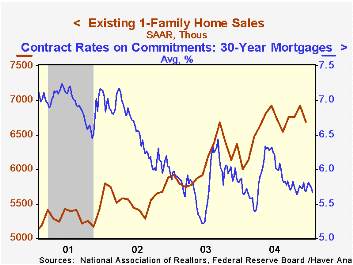
Sales of existing single family homes slipped 3.3% from the record high in November. At 6.69M, the December tally completed a year where sales rose 8.5% versus 2003 which had risen 9.0%. Consensus expectations had been for December sales of 6.80M.
The figures reflect closings of home sales in earlier months.
Sales were mixed m/m across the country's regions but set records everywhere for the year. In the South sales fell 4.2% (+6.3% y/y) and in the West sales fell 7.2% (+4.0% y/y). In the Midwest sales rose 1.4% (+3.7% y/y) and in the Northeast sales rose 1.4% (+4.2% y/y) after two down months.
The median price of an existing home single family home rose slightly to $188,900 (+8.1% y/y).
| Existing Home Sales (000, AR) | Dec | Nov | Y/Y | 2004 | 2003 | 2002 |
|---|---|---|---|---|---|---|
| Existing Single-Family | 6,690 | 6,920 | 5.0% | 6,614 | 6,098 | 5,593 |
Tom Moeller
AuthorMore in Author Profile »Prior to joining Haver Analytics in 2000, Mr. Moeller worked as the Economist at Chancellor Capital Management from 1985 to 1999. There, he developed comprehensive economic forecasts and interpreted economic data for equity and fixed income portfolio managers. Also at Chancellor, Mr. Moeller worked as an equity analyst and was responsible for researching and rating companies in the economically sensitive automobile and housing industries for investment in Chancellor’s equity portfolio. Prior to joining Chancellor, Mr. Moeller was an Economist at Citibank from 1979 to 1984. He also analyzed pricing behavior in the metals industry for the Council on Wage and Price Stability in Washington, D.C. In 1999, Mr. Moeller received the award for most accurate forecast from the Forecasters' Club of New York. From 1990 to 1992 he was President of the New York Association for Business Economists. Mr. Moeller earned an M.B.A. in Finance from Fordham University, where he graduated in 1987. He holds a Bachelor of Arts in Economics from George Washington University.






